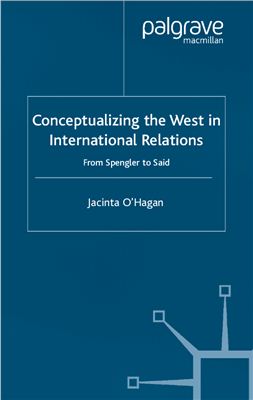Palgrave, 2002. 292 p.
West is a concept widely used in inteational relations, but we rarely reflect on what we mean by the term. Conceptions of and what the West is vary widely. This book examines conceptions of the West drawn from writers from diverse historical and intellectual contexts, revealing both interesting parallels and points of divergence. It also reflects on implications of these different perceptions of how we understand the role of the West, and its interactions with other civilizational identities.
The West and Cultural World Order.
The West, Civilizations and Inteational Relations Theory.
Towards a Framework for Conceptualizing the West in Inteational Relations.
Faust in the Twilight: Conceptions of the West in Oswald Spengler.
The Parochial Civilization: Aold Toynbee’s Conception of the West.
Universalizing the West? The Conception of the West in the Work of the ‘Inteational Society’ School.
History’s End? Francis Fukuyama’s Conception of the West.
Civilizations in Conflict: Samuel Huntington’s Conception of the West.
The Occident and its Significant ‘Other’: Edward Said’s West.
Conclusion: Continuities and Difference: Conceptions of the West and Cultural World Order Compared.
West is a concept widely used in inteational relations, but we rarely reflect on what we mean by the term. Conceptions of and what the West is vary widely. This book examines conceptions of the West drawn from writers from diverse historical and intellectual contexts, revealing both interesting parallels and points of divergence. It also reflects on implications of these different perceptions of how we understand the role of the West, and its interactions with other civilizational identities.
The West and Cultural World Order.
The West, Civilizations and Inteational Relations Theory.
Towards a Framework for Conceptualizing the West in Inteational Relations.
Faust in the Twilight: Conceptions of the West in Oswald Spengler.
The Parochial Civilization: Aold Toynbee’s Conception of the West.
Universalizing the West? The Conception of the West in the Work of the ‘Inteational Society’ School.
History’s End? Francis Fukuyama’s Conception of the West.
Civilizations in Conflict: Samuel Huntington’s Conception of the West.
The Occident and its Significant ‘Other’: Edward Said’s West.
Conclusion: Continuities and Difference: Conceptions of the West and Cultural World Order Compared.

